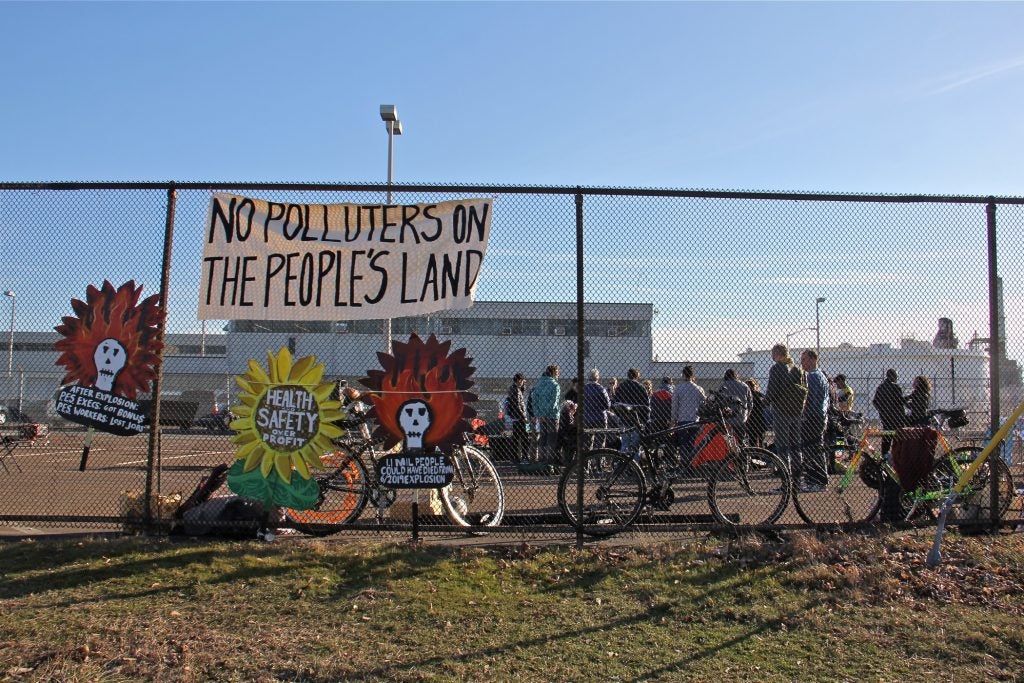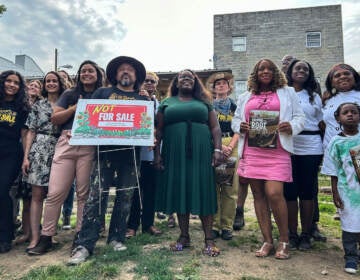Philly hits a ‘crossroads’ of environmental justice at ex-PES oil refinery
Hilco, the shuttered refinery’s new owner, is seeking permits to continue to store and sell petroleum — and surrounding communities feel betrayed.

The former PES refinery site in South Philadelphia. (Kimberly Paynter/WHYY)
Billboards, web ads, and SEPTA banners tout a fresh start for the South Philly refinery site, one that’s green, sustainable, and good for neighbors. Meanwhile, the site’s new owner is seeking permits to continue to store and sell potentially hundreds of millions of gallons of petroleum — and surrounding communities feel betrayed.
“They said they was going to come in, clean it up — it was going to be friendly to the community,” said Shawmar Pitts, a member of the activist group Philly Thrive who grew up near the refinery, at a permit hearing Thursday. “All this is bull crap, man. This is nonsense, for real.”
The permits under consideration for the former refinery site and Schuylkill River Tank Farm are the latest flashpoint in Philadelphians’ struggle to end decades of environmental inequity and racism and transition away from planet-warming fossil fuels.
The former Philadelphia Energy Solutions (PES) refinery site is nestled between largely Black and working-class neighborhoods of South and Southwest Philadelphia. While operating, the refinery emitted the most air pollution and greenhouse gases of any single source in the city. After an enormous explosion and fire in 2019 released thousands of pounds of dangerous hydrofluoric acid, it shut down. Hilco Redevelopment Partners (HRP) bought the site, promising to end refining activities but keep and maximize the use of the Schuylkill River Tank Farm on the west side of the river, where petroleum products can be stored and loaded onto trucks and barges. The company has since unveiled a vision for a huge e-commerce and logistics hub at the former refinery site, branded The Bellwether District.
That vision of the refinery’s prosperous — and cleaner — rebirth is still a long way off. Remediation of the massively contaminated site, where industrial uses date back to the Civil War era, is ongoing. Demolition itself is expected to take four years.
The five-year permits Philadelphia Energy Solutions Redevelopment & Marketing (PESRM), an indirect subsidiary of HRP, is seeking would renew and change air pollution permits that already exist. The changes proposed for the former refinery site would remove shut-down equipment, like refining equipment and boilers, from the permit, remove air pollution requirements that no longer apply, and reclassify the facility’s industry as demolition, rather than petroleum refining. The draft permit authorizes PESRM to continue operating numerous multi-million-gallon oil storage tanks at the former refinery site — and says the company plans to sell its remaining heavy and crude oil product before closing the tanks. The new permit proposed for the Schuylkill River Tank Farm, which officials say is currently not operating, would allow for the operation of dozens of other tanks for gasoline and petroleum liquids. Neither permit would let PESRM build new sources of pollution, but that’s little comfort to nearby residents.
Despite the allowances in the draft permits, the city does not expect PESRM to store and sell significant amounts of petroleum, said Philadelphia Department of Public Health spokesperson Matt Rankin, because refinery operations have ended and no new material is being processed or produced. HRP has also told the city the tank farm is being closed and is not expected to be sold or reopened, Rankin said.
“We lose if you agree to rubber-stamp it,” Jeffrey Singletary, a lifelong Grays Ferry resident with Philly Thrive, told city officials during Thursday’s hearing. “They’ve been saying the same thing, but they’re switching companies. When does it stop? Like, we’re fighting for what — for our children who have to fight also?”
Every single one of the close to two dozen people who testified at the hearing urged officials with the city’s Air Management Services to either reject the permits wholesale or drastically modify them by adding safeguards for nearby communities. Many painted the permits as at odds with HRP’s public persona. No company representatives spoke at the hearing.

“[The former refinery site] is under new management, and the new managers … have promised to be good neighbors,” said Earl Wilson, president of the Eastwick Friends & Neighbors Coalition. “I’m finding out now that Hilco and the city is beginning to move away from some of their environmental advances.”
Both the city and state have increasingly emphasized environmental justice in recent years, with members of the city’s new citizens’ environmental justice commission expected to be announced next month. Wilson, who has long fought for solutions to flooding and contamination in his Eastwick neighborhood, which borders the Schuylkill River Tank Farm, warned hearing officers Thursday that the city is at a critical juncture in this work.
“No one promised it would be easy or comfortable to keep moving toward environmental justice,” Wilson said. “But these are the defining crossroads.”
Public commenters were particularly concerned about the possible health risks that continued storage of petroleum at the former refinery site and tank farm might pose. Even since the refinery shut down, dangerous chemicals have been found coming off the site. Levels of cancer-causing benzene, which is a component of crude oil, measured along the perimeter of the property averaged more than three times the EPA’s actionable level in 2020. HRP officials have since said that all bulk benzene has been removed from the site.
If the proposed permits go through, it could mean less information for residents. According to city officials, shifting the former refinery site’s classification from “petroleum refining” to “wrecking and demolition” would eliminate benzene monitoring requirements.
“Until we stop seeing benzene pollution coming from the refinery, we want it regulated,” said Russell Zerbo, an advocate with the Clean Air Council. “We want that monitoring to be done.”
Katie Kennedy, a spokesperson for HRP, defended the proposed permit changes, saying in an email Thursday that the old permit requires monitoring of emissions sources, some of which have been eliminated during the refinery decommissioning process.
“The sources are shut down and The Bellwether District is no longer a refinery, therefore legacy refinery compliance rules are no longer applicable,” she wrote.
To some, the idea of continuing to store and sell petroleum products seems absurd amid the accelerating climate crisis.
“We’re going backwards by creating the storage for oil when we should be moving forward, like many other countries are doing, and other cities,” said Darien Thomas, a pastor in Eastwick, where climate change makes the threat of flooding worse. “We’re proposing that they re-evaluate their interest in profit by looking at green energy technology, so that our children’s children would not be left in this condition for the next 100 years.”

City residents are also calling for more air monitoring, not just at the former refinery’s fenceline but in neighborhoods. And they want more transparency from HRP about what’s going on at the site.
“They need to bring us into their facility for us to physically see their blueprint and their little, their 10-year planning,” said Singletary. “Every time it’s polluted, we need to know.”
Representatives with HRP did not grant PlanPhilly an interview for this article.
“We intend to let [the hearing] run its course,” HRP spokesperson Kennedy said.
The city’s Air Management Services could still modify or toss out the proposed permits — although officials say this is unlikely absent new information. Officials promise to address all public comments before taking final action.
Sonya Sanders begged city officials to listen to residents. Five generations of her family have lived near the refinery, and her husband died of cancer, which she attributes to the refinery’s pollution.
“It has to stop,” she said. “My life is worth more than any amount of money.”
 WHYY is one of over 20 news organizations producing Broke in Philly, a collaborative reporting project on solutions to poverty and the city’s push towards economic justice. Follow us at @BrokeInPhilly.
WHYY is one of over 20 news organizations producing Broke in Philly, a collaborative reporting project on solutions to poverty and the city’s push towards economic justice. Follow us at @BrokeInPhilly. 
Subscribe to PlanPhilly
WHYY is your source for fact-based, in-depth journalism and information. As a nonprofit organization, we rely on financial support from readers like you. Please give today.









